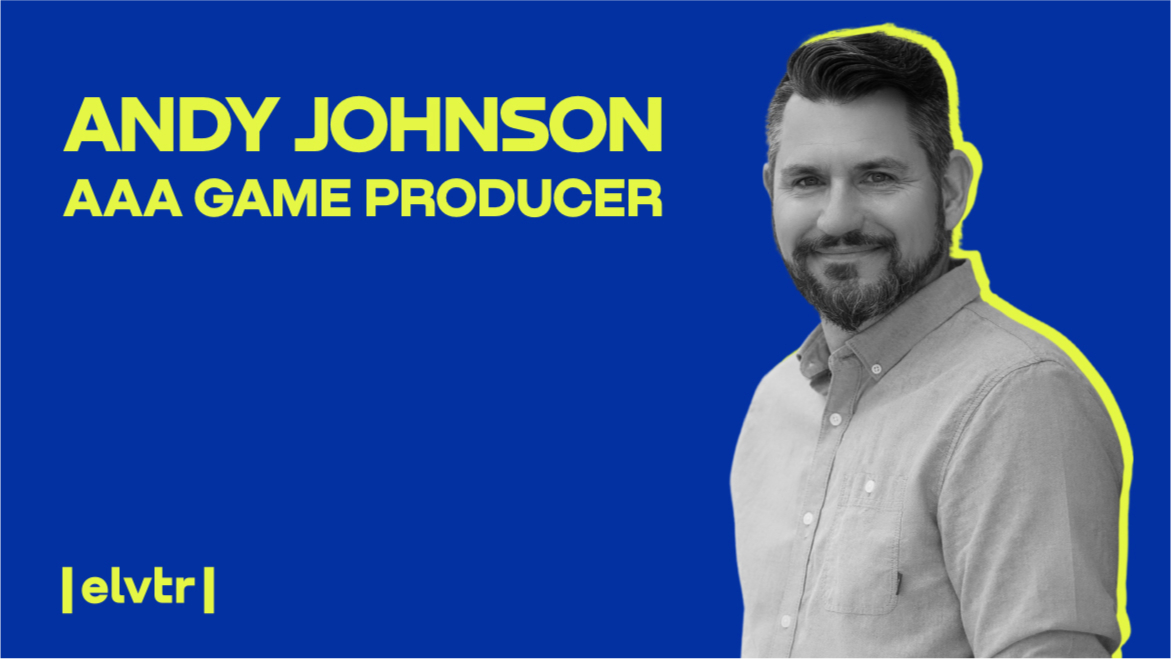- MAIN PAGE
- – elvtr magazine – ANDY JOHNSON: "GAME PRODUCERS SPEAK THE LANGUAGE OF ART, MUSIC, DESIGN AND ENGINEERING".
ANDY JOHNSON: "GAME PRODUCERS SPEAK THE LANGUAGE OF ART, MUSIC, DESIGN AND ENGINEERING".

Back in 1995, an ambiguous message scrolled across the screen during the credits of Super Street Fighter II Turbo (an accelerated version of an unofficial spin by the Taiwanese hacking group Hung Hsi Enterprise), “thanks to Andy Johnson.” Thanks for what pondered the era’s Gamers as they hit the I/O button on their 32 bit Amiga.
Indeed, the 90s were the formative years for the roles involved in game development and few knew much about what went on behind the walls of game production studios.
Since his name first appeared in pixels, Johnson has had an illustrious 26-year career in Localization and Game Production. During the arch of his career, Johnson has contributed to a wide list of massively successful games, including but not limited to:
- Metro 2033 (2010),
- Metro: Last Light – Redux (2014),
- Injustice: Gods Among Us (2013),
- Saints Row: The Third (2011),
- Warhammer 40.000: Space Marine (2011),
- Warhammer 40,000: Dawn of War II – Retribution (2011),
- The Banner Saga 3 (2018)
Over the past two decades, both the role of Game Producer and video game technology has evolved immensely. Nowadays, 32-bit computers make better bookends than gaming consoles and a Game Producer no longer has “an overarching power” at every studio.
Despite numerous iterations in the field of game production, Johnson has retained his status as “The Guru of Game”. He continues to leave his mark on gaming as Senior Producer at Pokemon Company International.
“GAME PRODUCERS SPEAK THE LANGUAGE OF ART, MUSIC, DESIGN, AND ENGINEERING”
What does a Game Producer do?
At one time, Game Producers were like Film Directors. Game Producers had an overarching power, the final word on all game-related decisions. But the role has evolved. Nowadays, Game Producer means something different at each studio.
Yet at the very core, being a Game Producer is all about steering the ship. In this role, you:
- ensure that the project hits prescribed milestones and release dates;
- mitigate risks;
- facilitate the team, letting them do what they’re good at.
Above all, a Game Producer is a sort of pantologist. At times Game Producers assume the role of Product Owner, Product Manager, Design Director, Technical Program Manager, and trouble-shooter.
In fact, Game Producers aren’t experts in any one aspect of game development, but, possess knowledge of a game’s numerous composite parts. And generally speaking, Game Producers are highly influential over what goes into a game, when it goes in, what bugs are fixed and when those bugs are fixed.
What are the core traits a person should have to become a successful Game Producer?
It’s said that a Game Producer must have a crystal ball and the ability to read it like a soothsayer. With this orb, Game Producers attempt to foresee any roadblocks that might stand in the way of the development team.
Additionally, Game Producers mitigate risks. To do so, a Game Producer must remain flexible, and retain the ability to pivot — when unforeseeable challenges or advances in technology (predicaments we neglected to divine with our crystal ball) surface.
As you may know, games are developed over the course of years, during this time new technology may come about that allows for novel features (backgrounds, game duration and ETC) and assets (sound effects, maps and various other objects).
A Game Producer must decide whether or not to attempt to include the latest features and assets into the game so late in development, fully aware that the release date might not change.
Hence, Game Producers must pivot direction, adapt the emerging technology to the game’s core, hopefully, something solid, patched, and updated, and change the road map, or decide to forego cutting-edge features. A bit of advice, it’s wiser to have a solid game than a broad feature set with unattended bugs.
Who do you usually get to work with as a Game Producer?
In many ways a Game Producer is a translator, we speak the language of art, music, design, and engineering.
A top-notch Game Producer understands the jargon and objectives of each department and is able to communicate tasks and goals to the various groups involved in game development.
For example, Marketing, Sales and Customer Service aren’t technically minded, they don’t speak the same lingo as, for example, Programming.
And so, a successful Game Producer will have had experience with each of the aforementioned groups and speak their language. In general, a successful Game Producer will, to some degree, have knowledge of the coding and art involved in constructing a modern video game.
"A GAME PRODUCER MUST HAVE A PASSION FOR GAMING"
What kind of background is required to be a Game Producer?
There’s no one road to becoming a Game Producer, many paths may lead the aspirant there. But often Game Producers began their career in Quality Assurance (QA) or as Testers (those involved in development who are actively searching for bugs or attempting to break the game).
Testers and QA get to see the convergence of a video game’s composite parts. Because they work with nearly finished projects rather than a single piece of the puzzle like audio, for example, they see all of the decisions that have come about over the course of multiple years coming together, both the issues that arise and the solutions. Knowing what issues may arise, they can try and avoid them when they become a Game Producer. So, the progression from QA to Game Producer is quite natural.
All-in-all, beginning in QA, becoming a Lead Tester, progressing to Assistant Producer and ending as a Game Producer is a fairly organic career path. Although there isn’t a set path, I can offer this advice to the aspiring Game Producer, it’s the same advice I’d give to myself as a novice (if I could pick up the phone and call the past). If possible, join a smaller team where you will learn more rather than a large team where you might end up a minuscule cog on a giant wheel.
Can just anyone be a Game Producer or is being a Gamer is a prerequisite?
The project management aspects of game development can be taught. But the most important thing is to have a passion about games.
It’s an indisputable fact that a Game Developer must stay current and be aware of the features and assets that make the contemporary gaming experience enjoyable, as well as best practices in the ever-evolving field of game development. If you’re not a Gamer, you will not be able to stay in the current, then you will become much more methodical, and your team will feel that. Successful Game Producers need passion to remain relevant.
Is it possible for an independent developer to create a game for less than $100K?
The gaming industry is much like the movie industry, it’s challenging to be commercially successful without the budget of a major studio, but it can be done.
A of couple examples of games created by independent developers on shoestring budgets are Stardew Valley and Minecraft. Both were passion projects.
Stardew Valley was created by Eric "ConcernedApe" Baron. He had to learn all aspects of game development on his own, it took him 5 years. As for the cost of development, Baron merely had to purchase some equipment and invest time into the project. So essentially, Stardew Valley was created for free.
And then there’s Minecraft, it was crafted by Markus "Notch" Persson in Java. The game is what I call “programmer art,” this “art” is really unattractive without all the mods (user-created alterations to the appearance of Persson’s program). Nonetheless, Minecraft became popular via word of mouth, went viral, and blew up.
Flappy Bird is another great example of a game that went viral. So, it’s possible to make a game and then have it explode. But, this depends on timing and luck rather than experience and marketing.
Independent games aside, it takes millions of dollars to acquire a development team and be successful in today’s market. Besides, the aspiring Game Producer will need investors for marketing as well. In fact, there are many great games out there, especially in-app stores that simply don't get any attention due to lack of funding.
It's not just creating a great game that causes it to be successful. It's the process afterward too, which is equally important, the process of getting the word out to potential players.
"...A GOOD SENSE OF HUMOR AND A THICK SKIN ARE KEY TO SURVIVING DEVELOPER’S BURNOUT."
What was the most challenging video game you’ve worked on?
Back in 2015, I worked as Head of Localization (prepared games for release in various parts of the world) for King Entertainment, Seattle.
Together we crafted a comparatively small iOS and Android game, Paradise Bay. And although Paradise Bay is lite when compared to other games, I’ve had a hand in developing, like Banner Saga III, developing Paradise Bay was massively rewarding. We even won a few awards for the project. So, a game doesn’t have to be large-scale to be gratifying.
Yet, the most satisfying game to produce was Disney Pixar’s Cars. During production, there were new challenges, nearly every day. Sure, the project was a labor love and there were many perks. For example, we were flown to California several times and hung-out at Pixar Studio.
While at the studio, we were treated to an early rough-cut screening of Cars. However, Cars was an extremely difficult game to develop, there were so many things going on, I literally crunched for over a year, personally, physically, and mentally producing the game was overwhelming.
But at the same time, it was highly rewarding because Cars the movie was eventually released and the game exploded.
How do you survive developer burnout?
My personal style is to try to develop games in a sustainable way. So, I try to cut the work into achievable chunks. This ability comes with experience and compassion for the team that you work with.
All things considered, I feel a good sense of humor and a thick skin are key to surviving developer burnout.
What can one expect to learn at your course?
This course was specifically designed to take you through a development track as a game producer.
You will learn the core composites of a team and how they work together. We’re going to learn real-world practices of implementing Agile and Scrum, and what to avoid there. We’re also going to talk a lot about risk mitigation.
The goal of this course is to get you to the mindset of a Game Producer and talk to other producers in their language. By the end of this course, you should be prepared to pass that first interview and get you into your first role.
*ELVTR is disrupting education by putting proven industry leaders in a virtual classroom with eager rising stars. ELVTR courses offer 100% instructor driven content designed to give you practical knowledge within a convenient time frame. Choose the right course for you!

